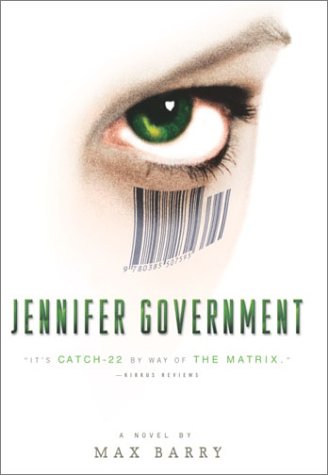
 |
Jennifer GovernmentThe Free Market Gone Berserk |
Title: Jennifer Government
Author: Max Barry
Publisher: Vintage
Vital Stats: © 2003; trade paperback, 321 pp.; US$13.95
ISBN: 1-400-03092-7
Freak Nation Rating: ![]()
![]()
![]()
![]()
Buy It From: Powell’s Books
Max Barry’s cyberpunk satire Jennifer Government is a cautionary fable, answering the question “What would happen if the laissez-faire free-market advocates actually got the kind of world they’ve been promoting?” In Barry’s dark rollercoaster of a future, nearly the entire world has become one of the “United States Federated Economic Blocs”, effectively becoming franchises of the US’ anarcho-capitalist system. Defanged governments no longer have the resources to control corporations; people now adopt the names of their employers as their last names: certain well-known modern CEOs would be Bill Microsoft, Steve Apple, and Michael Disney. Roads are privatized, and driving anywhere incurs a toll. Each corporation runs its own private school for its employees’ children, and even 911 (now the Nine-Eleven Emergency Corporation) won’t dispatch an ambulance without getting your credit card number first.
When Vice President of Guerilla Marketing John Nike has a problem with a new product release, he contracts lowly peon Hack Nike to boost the shoes’ profile. Only after signing on the dotted line does Hack discover that his assignment is to gun down ten buyers on the day of the shoes’ release, sending the demand (and thus the price) into the stratosphere. Hack, unfortunately, has ethics (and no experience with guns), so instead he tries going to the Police, Inc. Savvy entrepreneurs that they are, they naturally fix the situation by subcontracting the job from Hack, starting a chain of events that sweeps up a diverse ensemble of characters, such as:

Worried that I’ve just spoiled half the plot? Have no fear; Barry packs all that initial setup into the first 34 pages. In fact, Barry’s plotting is so swift and propulsive that it isn’t until about halfway through the book that the reader is able to form even a rough understanding of the overall trajectory it’s following. Until then, one is simply carried along on the (very entertaining) wave of cascading events started by John Nike’s rather extreme marketing gimmick. In fact, the reader is swept along much like Billy NRA, who simply wants to go on a vacation to New Zealand, but instead gets dragooned into a starring role in the novel’s central conflict. (His employer may have begun its life as a political lobbying group, but now they’re a mercenary security firm.)
Telling you about that central conflict would, alas, require spoiling some plot points from much later in the book; suffice it to say that the nature of that conflict actually dovetails fairly well with the author’s real point: that privatizing everything and having the free market handle the things we now look to government for would have disastrous consequences for everyone except — possibly — the very uppermost executives of the largest corporations. Even being a shareholder is no use if you have no civil rights, and since civil rights for average people don’t help the corps’ bottom lines, they will eventually die off.
That point is incredibly dry as an economic treatise, so Mr. Barry has sensibly spruced it up by transforming it into a rollicking cyberpunk satire. Instead of rambling on about privatization and civil rights, he can simply have Hack Nike ask John Nike, regarding his homicidal marketing plan: “Isn’t this kind of... illegal?” and give John’s henchman (also named John) the response “Yes, it’s illegal. Killing people without their consent, that’s very illegal”, and let Exec VP John drive the point home, so: “But the question is: what does it cost? Even if we get found out, we burn a few million on legal fees, we get fined a few million more... bottom line, we’re still way out in front.” (All ellipses in original.)
The only problem is that Barry’s novel, by being such an over-the-top satire, actually undercuts its own point. A premise like “Corporations are so callous and rapacious that if they thought they could profit by it, they’d happily shoot their own customers” isn’t so outlandish even in today’s world. (Consider Fight Club’s analogous point about the economics of product safety recalls.) But by setting his example in such an exaggerated cyberpunk future, Barry makes all of his own best examples into outlandish fiction, instead of “this could happen tomorrow — easily”.
Another problem, and possibly a related one, is that Max Barry’s considerable wit and charm get in his own way. Perhaps without even meaning to, he’s made the book’s main villain entirely too cool. By handing so many delicious lines to the character that’s intended to represent the shallowest and cruelest aspects of unbridled corporate greed, he turns his ostensible antagonist into an example to be emulated. Even the comeuppance he gets isn’t enough to undo that problem; despite being one hundred percent wrong about both economics and personal relations, the impression I had by the end of the book was that he was still cooler than any other three characters combined.
In an action-adventure story, like Indiana Jones and the Raiders of the Lost Ark or the original Star Wars trilogy, you can get away with making your villains cooler than your heroes. If Belloq is suaver than Indiana Jones, if Darth Vader is simply the ultimate bad-ass and twenty times cooler than Luke Skywalker, it’s not a crucial problem. In tales of heroism, the important part is that the hero wins. But Max Barry’s book is at heart an allergory; different characters specifically represent certain ideals. And in an allegory, making your villain cooler than your heroes is fatal, because it’s tantamount to saying that that the villain’s philosophy really is superior to the heroes’ views. In which case, why not rewrite the book to make the villain into the hero?
Perhaps I’ve spent too much time describing the novel’s flaws; the problem is that these flaws are fairly subtle, and can’t easily be summed up in quick phrases like “the character portrayals undercut the intent of the allegory” without leaving my own readers confused. When all is said and done, remember that I’m giving this book a full three stars, unreservedly. I haven’t bothered to reproduce some of its more sparkling quotes because, if I did, this review would be twice as long; Barry has a fresh and scintillating wit, and Jennifer Government is nearly as quotable as Douglas Adams’ Hitchhiker’s Guide trilogy.
The pacing in Jennifer Government is tight and cinematic. In fact, this entire book is just crying out to be made into a movie. Hip guy that Max Barry is, he’s probably noticed that already.
Kai MacTane is the Freak Nation’s webmaster. When not working as a web developer, he enjoys dancing with fire, and DJing a mix of music that ranges from goth-industrial to Celtic world-beat. He’s lived in San Francisco since the summer of 1995, having moved across the continent along with five other freaks. He’s still not sure what he wants to be when he grows up.